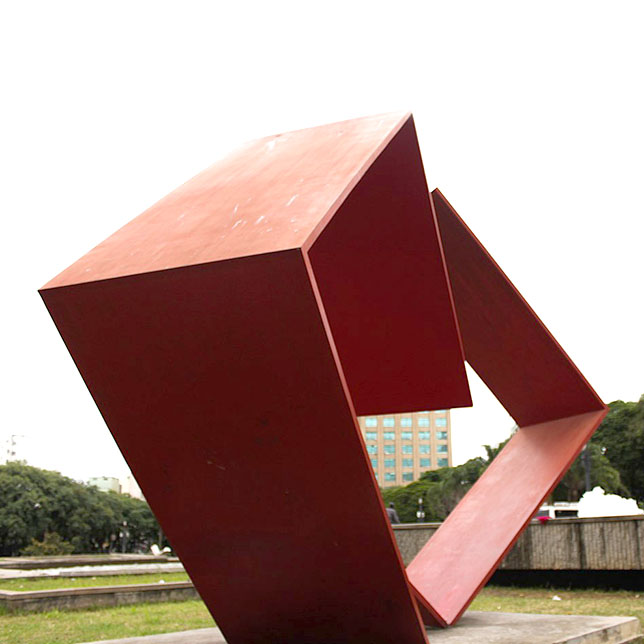Franz Josef Weissmann (1911 – 2005) was a Brazilian sculptor born in Austria, emigrating to Brazil while he was eleven years old. Geometric shapes, like cubes and squares, are strongly featured in his works. He was one of the founders of the Neo-Concrete Movement.
In Rio de Janeiro, between 1939 and 1941, he attended architecture, painting, drawing and sculpture classes at the National School of Fine Arts. From 1942 to 1944, he studied drawing, sculpture, modeling and foundry with August Zamoyski. In 1945, he moved to Belo Horizonte where he taught drawing and sculpture in private classes. Three years later, Alberto da Veiga Guignard invited him to teach at the "Escola do Parque", later renamed Escola Guignard.
Starting from 1950 onwards, he gradually developed a constructivist style, favoring geometric shapes, cutting and folding sheets of iron, steel wires and aluminum. He joined Grupo Frente, in 1955. The next year, he returned to Rio de Janeiro and participated in the National Exposition of Concrete Art in 1957. In 1959 Weissmann traveled to Europe and East Asia, returning to Brazil in 1965.
In the 1960s, Weissmann exhibits the series of sculptures Amassados (Dented), which he created in Europe with hammered zinc and aluminum sheets, aligning himself briefly to informalism. Later on he returned to the constructivist works. In 1970 he won the award for best sculptor by the Brazilian Association of Art Critics and participated in the International Outdoor Sculpture Biennial, in Antwerp, Belgium, and at the Venice Biennale.
Weissmann made several public art sculptures for Brazilian cities, like at Praça da Sé, in São Paulo and at Parque da Catacumba, in Rio de Janeiro. He kept studios in Belo Horizonte (1950); Madrid, (1962) and Ipanema, Rio de Janeiro (1956 and 1965).
© 2019. All images are copyrighted © by Franz Weissmann or assignee. Apart from fair dealing for the purpose of private study, research, criticism or review as permitted under the Copyright Act, the use of any image from this site is prohibited unless prior written permission is obtained. All images used for illustrative purposes only.
In Rio de Janeiro, between 1939 and 1941, he attended architecture, painting, drawing and sculpture classes at the National School of Fine Arts. From 1942 to 1944, he studied drawing, sculpture, modeling and foundry with August Zamoyski. In 1945, he moved to Belo Horizonte where he taught drawing and sculpture in private classes. Three years later, Alberto da Veiga Guignard invited him to teach at the "Escola do Parque", later renamed Escola Guignard.
Starting from 1950 onwards, he gradually developed a constructivist style, favoring geometric shapes, cutting and folding sheets of iron, steel wires and aluminum. He joined Grupo Frente, in 1955. The next year, he returned to Rio de Janeiro and participated in the National Exposition of Concrete Art in 1957. In 1959 Weissmann traveled to Europe and East Asia, returning to Brazil in 1965.
In the 1960s, Weissmann exhibits the series of sculptures Amassados (Dented), which he created in Europe with hammered zinc and aluminum sheets, aligning himself briefly to informalism. Later on he returned to the constructivist works. In 1970 he won the award for best sculptor by the Brazilian Association of Art Critics and participated in the International Outdoor Sculpture Biennial, in Antwerp, Belgium, and at the Venice Biennale.
Weissmann made several public art sculptures for Brazilian cities, like at Praça da Sé, in São Paulo and at Parque da Catacumba, in Rio de Janeiro. He kept studios in Belo Horizonte (1950); Madrid, (1962) and Ipanema, Rio de Janeiro (1956 and 1965).
© 2019. All images are copyrighted © by Franz Weissmann or assignee. Apart from fair dealing for the purpose of private study, research, criticism or review as permitted under the Copyright Act, the use of any image from this site is prohibited unless prior written permission is obtained. All images used for illustrative purposes only.
 |
| Mr Franz Weissmann |
 |
| 1951, Cubo em cantoneiras |
 |
| 1953, Composition with Semicircles |
 |
| 1954, Two virtual linear cubes |
 |
| 1957, Coluna neoconcreta |
 |
| 1958, Ponte |
 |
| 1958, Terra |
 |
| 1958-78, Espaço circular em cubo virtual |
 |
| 1969, Estructura |
 |
| 1970, Entitled |
 |
| 1975, Cantoneiras |
 |
| 1975, Cantoneiras |
 |
| 1975, Sem título |
 |
| 1977, Coluna média em cantoneiras diagonais |
 |
| 1978, Estrutura em diagonal |
 |
| 1979, Diálogo |
 |
| 1979, Diálogo |
 |
| 1980, Lâmina larga em torção no espaço |
 |
| 1984, Terra |
 |
| 1985, Encontro |
 |
| 1985, Grande quadrado preto com fita |
 |
| 1985, Quadrado em torção no espaço |
 |
| 1986, Escultura |
 |
| 1986, Escultura |
 |
| 1986, Flor de Aço |
 |
| 1986, Flor de Aço, and Portal |
 |
| 1986, Untitled |
 |
| 1986, Untitled |
 |
| 1989, Grande Flor Tropical |
 |
| 1992, no espaço |
 |
| 1994, Mondriama |
 |
| 1996, Leaked Rectangle |
 |
| 2008, Manoel Macedo Galeria de Arte |
 |
| 2008, Sem Título |
 |
| Blue Cube |
 |
| Vista traseira do monumento Grande Flor Tropical |





No comments:
Post a Comment